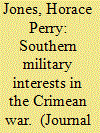|
|
|
Sort Order |
|
|
|
Items / Page
|
|
|
|
|
|
|
| Srl | Item |
| 1 |
ID:
110887


|
|
|
|
|
| Publication |
2012.
|
| Summary/Abstract |
The article is based on documents kept in the Russian State Military Archive and on other reliable sources. It highlights the use of chemical warfare by the Red Army during the suppression of the Tambov insurrection in 1921. It shows that the practical usage of asphyxiating gases was actually very limited. Each case is described in great detail.
|
|
|
|
|
|
|
|
|
|
|
|
|
|
|
|
| 2 |
ID:
110885


|
|
|
|
|
| Publication |
2012.
|
| Summary/Abstract |
When the Crimean War, which pitted Russia against Turkey, Britain, and France, erupted in the mid-nineteenth century, the Southern section (the states of the future Confederacy) of the United States followed the battles and military maneuvers of the conflict intently. Generals, heroes, and tactics of all the belligerents were subjects of speculation. Poems, parodies, and articles were rife in Southern newspapers about the war. The South bemoaned what it considered a lack of action, and enjoyed comparing it with America's previous war, naturally to the advantage of the U.S. As the war ran its course, the bulk of Southern sympathy lay with the Russians, possibly because of a similar labor system-serfdom in Russia and slavery in the South. The heroic stand of Sebastopol, the last great Russian bastion, was lauded by the South and, when it finally fell, its loss was bemoaned. Not only the South, but all America was interested in the war and future Civil War Northern generals McClellan and Hallack, along with other military personnel, were sent to the Crimea as observers.
|
|
|
|
|
|
|
|
|
|
|
|
|
|
|
|
| 3 |
ID:
110886


|
|
|
|
|
| Publication |
2012.
|
| Summary/Abstract |
In the English literature, for the first time, the history of the Turkmen people in days of the Second World War is described. As it is known, the Turkmen Soviet Socialist Republic was one of fifteen republics of the former USSR. Therefore, since the first days Turkmens as citizens of the Soviet Union took active part in this war. In article of the author the quantity of military connections, including national, generated on territory of Turkmenistan, number human loss, awarded people, data on participants of guerrilla movement and the Resistance movement in countries of Western Europe is described. In this article the economic and cultural condition of republic in days of the war, the help rendered by the Turkmen people to front is described. For the first time in Turkmen historical sciences the question on destinies of the captivated Turkmen soldiers in days of the Second World War is brought up.
|
|
|
|
|
|
|
|
|
|
|
|
|
|
|
|
| 4 |
ID:
110884


|
|
|
|
|
| Publication |
2012.
|
| Summary/Abstract |
This article examines why Ukraine has struggled to build an effective and efficient coastal navy able to protect and advance its interests in the Black Sea and beyond. Using the literature on maritime power the argument explores how Ukraine's ability to use the sea has declined significantly over the last five years. It argues that chronic under-funding of Ukraine's ambitious military transformation, recent decisions taken by the government to extend the Russian lease of Sevastopol and to declare its non-aligned status, and ongoing domestic political instability have all damaged Ukraine's maritime power.
|
|
|
|
|
|
|
|
|
|
|
|
|
|
|
|
| 5 |
ID:
110883


|
|
|
|
|
| Publication |
2012.
|
| Summary/Abstract |
This article outlines a theory explaining why and how states open territorial frontiers, an inquiry overlooked by students of international relations because of assumptions that most territorial sovereignty issues had been decided following the Second World War-that territoriality was of declining relevance in international affairs, and that the state would be eclipsed by transnational political actors. States open frontiers for the same reason they acquire client states: additional territory offers additional power resources-strategic military position, access to natural resources, captive markets, and international prestige-which are important in an international environment characterized by anarchy. Assertion of sovereign claims to new territory is the precursor to economic development and perhaps settlement. The latter require the state to absorb unrecoverable costs as well as much of the economic risk for private firms and settlers.
|
|
|
|
|
|
|
|
|
|
|
|
|
|
|
|
|
|
|
|
|